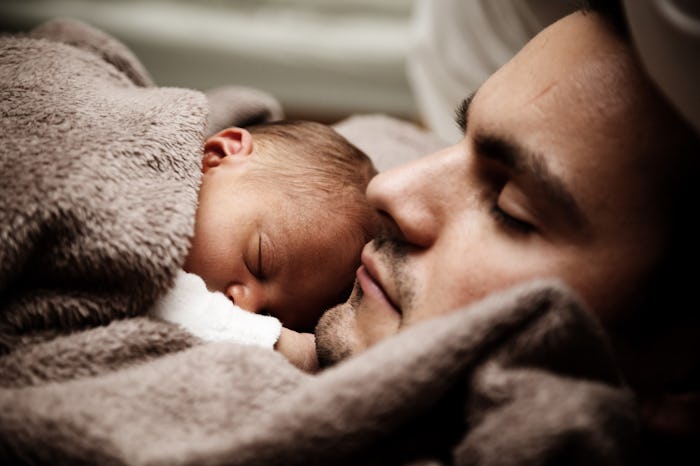Sometimes it feels impossible to put kids to sleep. Between needing a bedtime story, a glass of water, and cuddles, it can all be a bit tiring, to say the least. In some cases, this is where some might (unwisely) turn to non-traditional sleep aides, such as antihistamines like Benadryl. But parents should probably think twice before using them: According to ABC News, parents are being warned about using antihistamines like Benadryl to help their kids sleep following several deaths in the state of Connecticut.
It's age-old advice that's been floating around for some time — fussy kids? Give them Benadryl to make them drowsy and they'll fall asleep. (In hindsight, definitely an unsafe suggestion.) But the Office of the Child Advocate in the state of Connecticut issued a warning this past month about parents using antihistamines, like Benadryl, in order to help their infants go to sleep. This warning was issued, according to NBC Connecticut, after at least four children in Connecticut reportedly died from reactions to antihistamine drugs.
Dr. Kristen Bechtel, associate professor of pediatrics and emergency medicine at the Yale School of Medicine and co-founder of Connecticut's Child Fatality Review Panel noted that up until 2015, there had only been four deaths due to antihistamines in the last 15 years. Since 2015, there has been a "cluster" of high profile cases in the state involving infants overdosing on antihistamines.
Antihistamines, which are used to treat allergy symptoms, are sometimes used by parents as a sleep aid, according to ABC News, although the Food and Drug Administration advises that children under the age of 2 should not use this medication. When used properly, of course, they prevent the unpleasant symptoms that come along with allergy symptoms or relieve the symptoms of a minor reaction. But when used improperly, as is the case for any medication, they can become dangerous.
Representatives at McNeil Consumer Healthcare, which produces Benadryl, have not yet responded to Romper's request for comment on the findings.
The public health alert, obtained by NBC Connecticut, states:
Caregivers should never use Benadryl or other antihistamines in order to get their infants to be quiet or sleep. Antihistamines like Benadryl should only be used when prescribed by a licensed medical provider. Benadryl is for the treatment of medical conditions like allergic reactions, seasonal allergies, or itching from skin conditions like poison ivy or eczema.
Bechtel told the Norwich Bulletin that a problem with children accidentally overdosing from antihistamines is rooted in "a lack of hard information."
"There are not a lot of peer reviews or surveys from pediatricians or parents on the issue," Bechtel said.
The alert cites that a 2011 poll, conducted by Today and Parenting magazine, which sampled 26,000 mothers — and one in five of those mothers admitted to "giving their children medicine such as Benadryl or Dramamine to get through a big event" such as a road trip or flying on an airplane. Even scarier is that one in 12 moms confessed to "regularly dosing their kids with sleep-inducing medication."
Yet, studies have found that antihistamines aren't exactly the best sleep aid. A 2013 Baylor College of Medicine study found that using antihistamines to make a child sleep could possibly cause sleepwalking — and could even make a child hyperactive, rather than put them to sleep. "Using Benadryl or any antihistamine for sleep has no long term benefit," Dr. Philip Alapat, assistant professor of medicine said. "Most people develop a tolerance very quickly."
So the next time parents are looking for a quick fix to help their child fall asleep, they should reconsider reaching for over-the-counter antihistamines and consult with a doctor that knows their child best, instead — and save that Benadryl for when your kids really need it.
